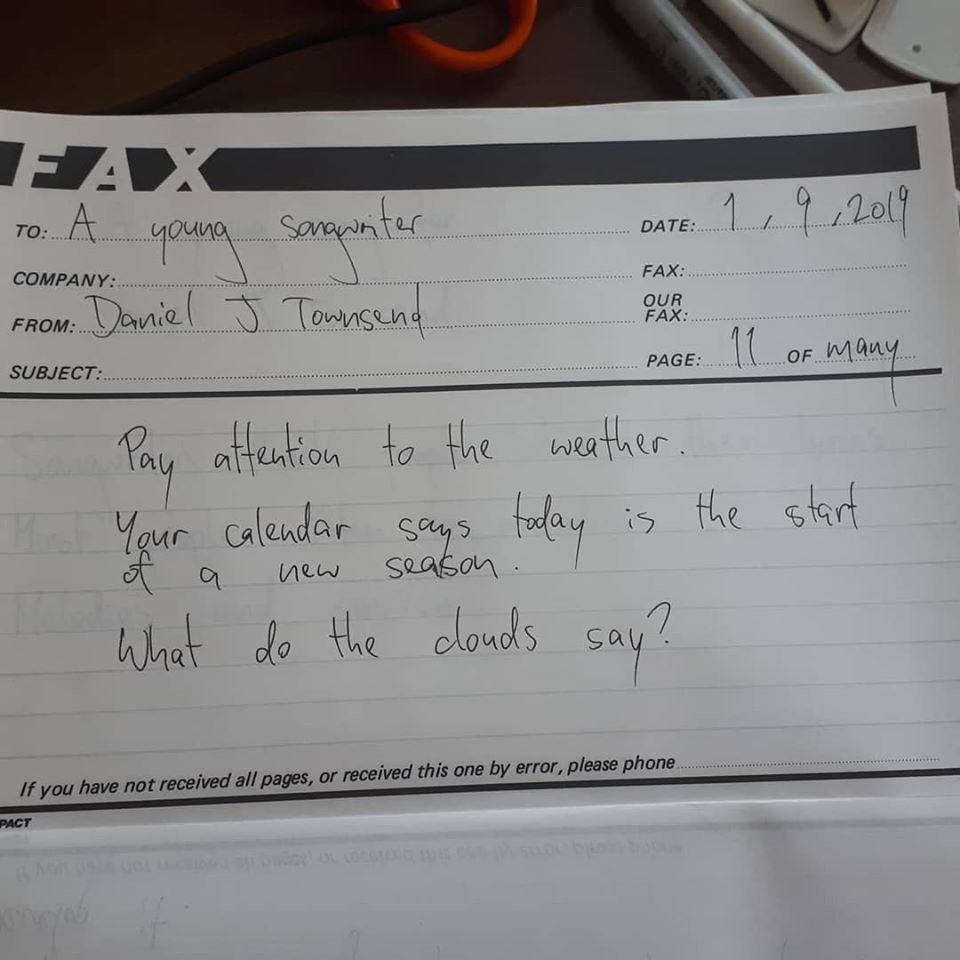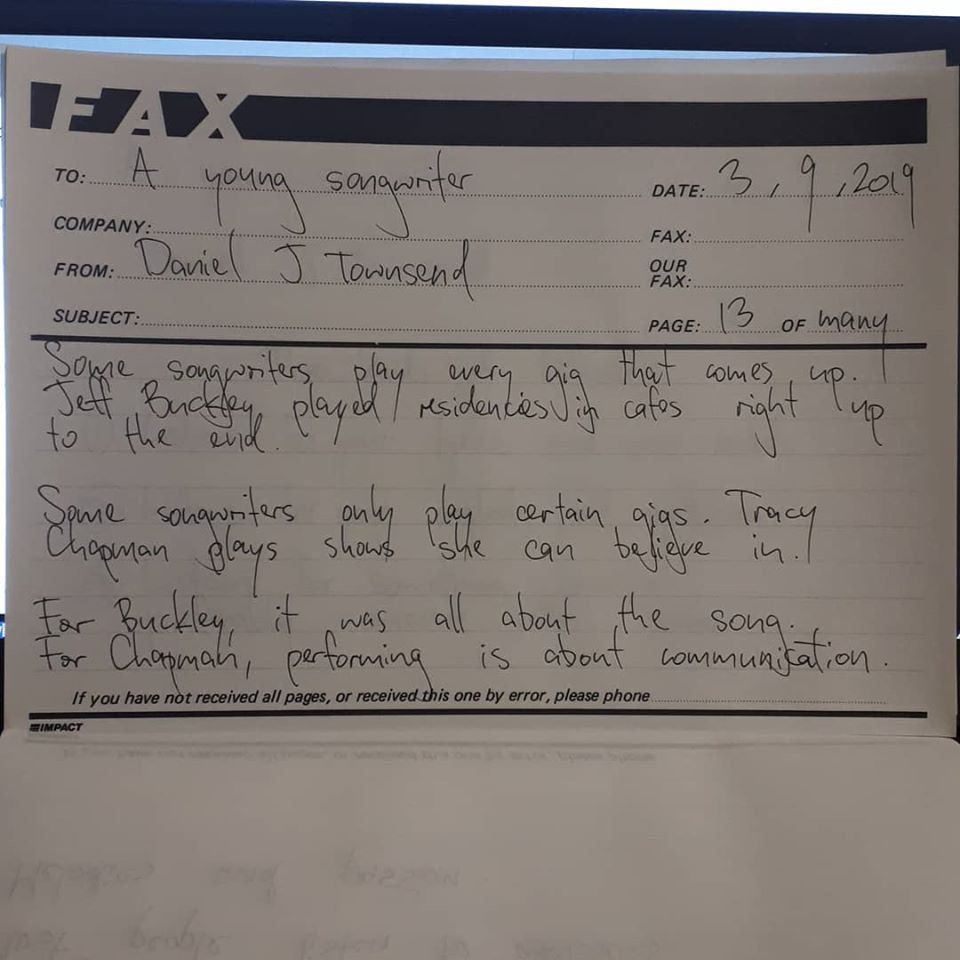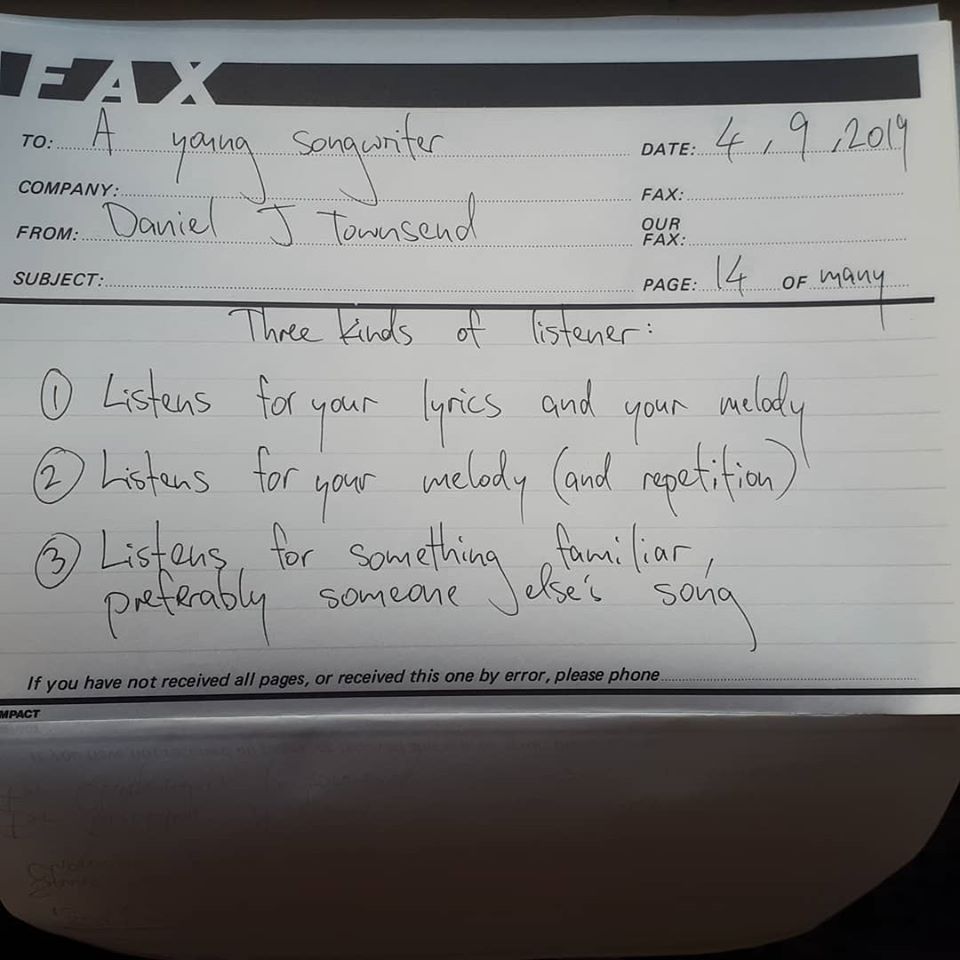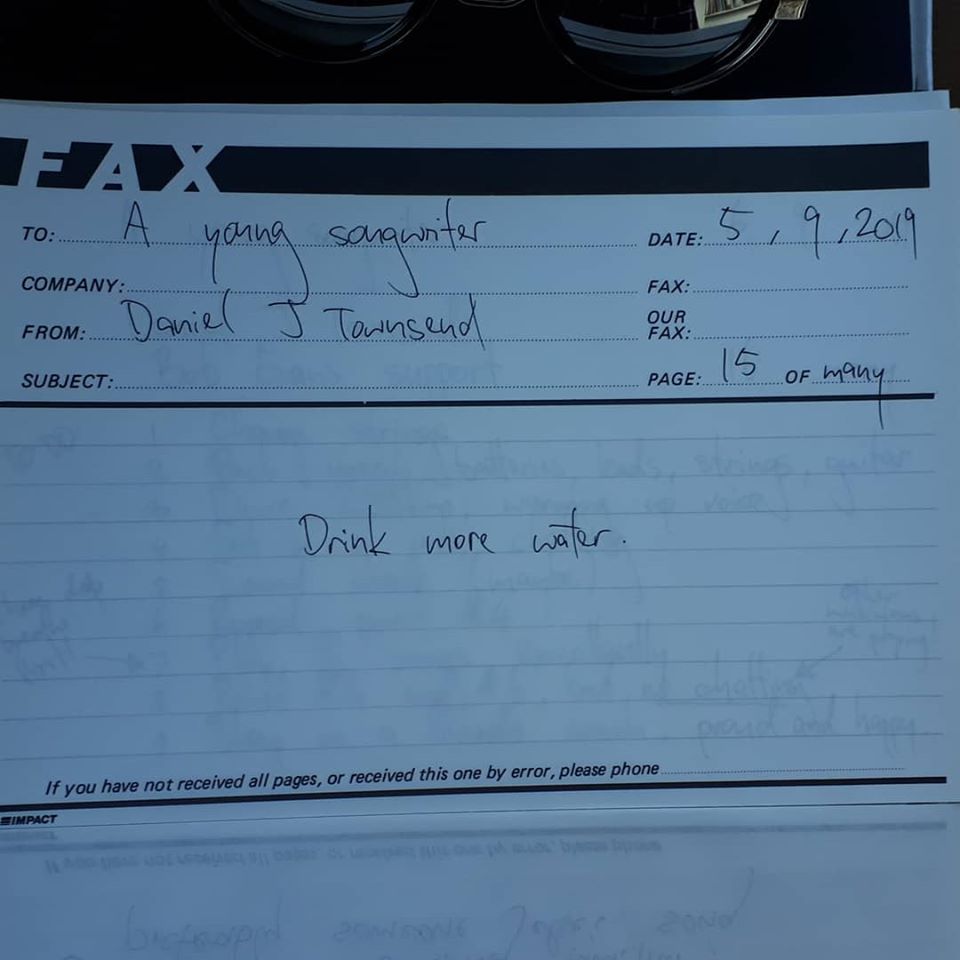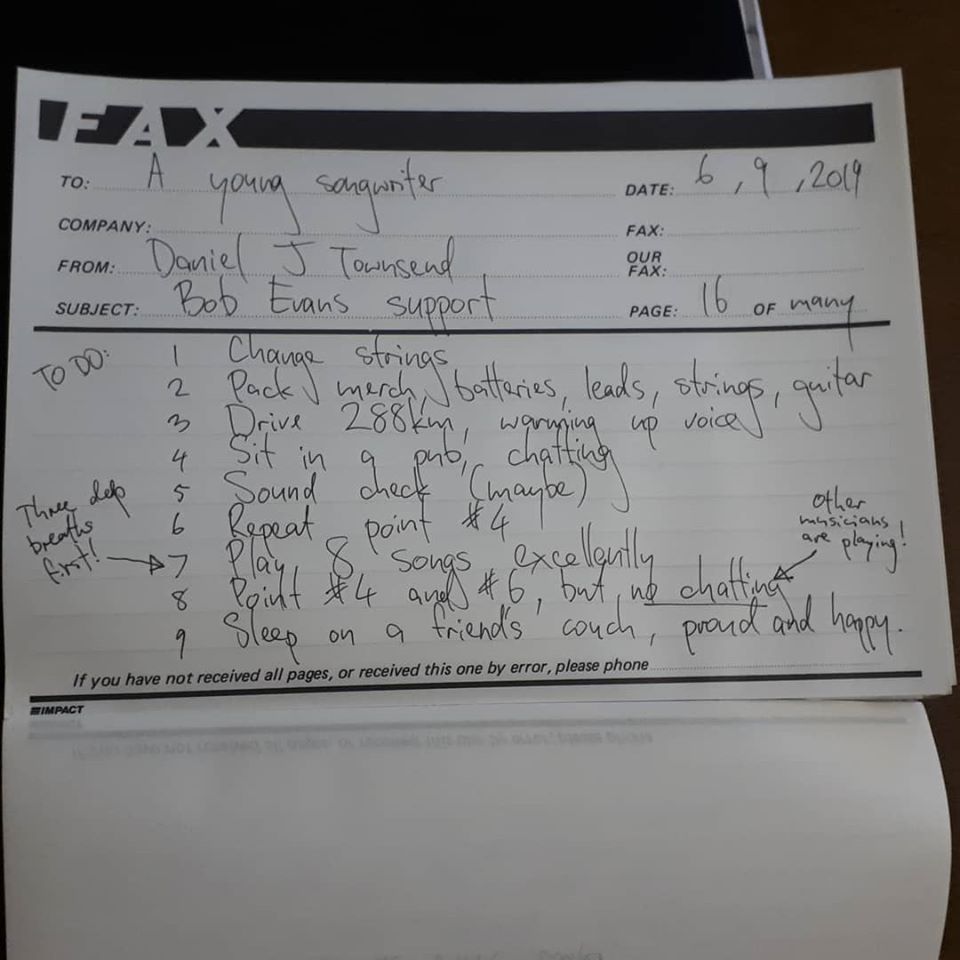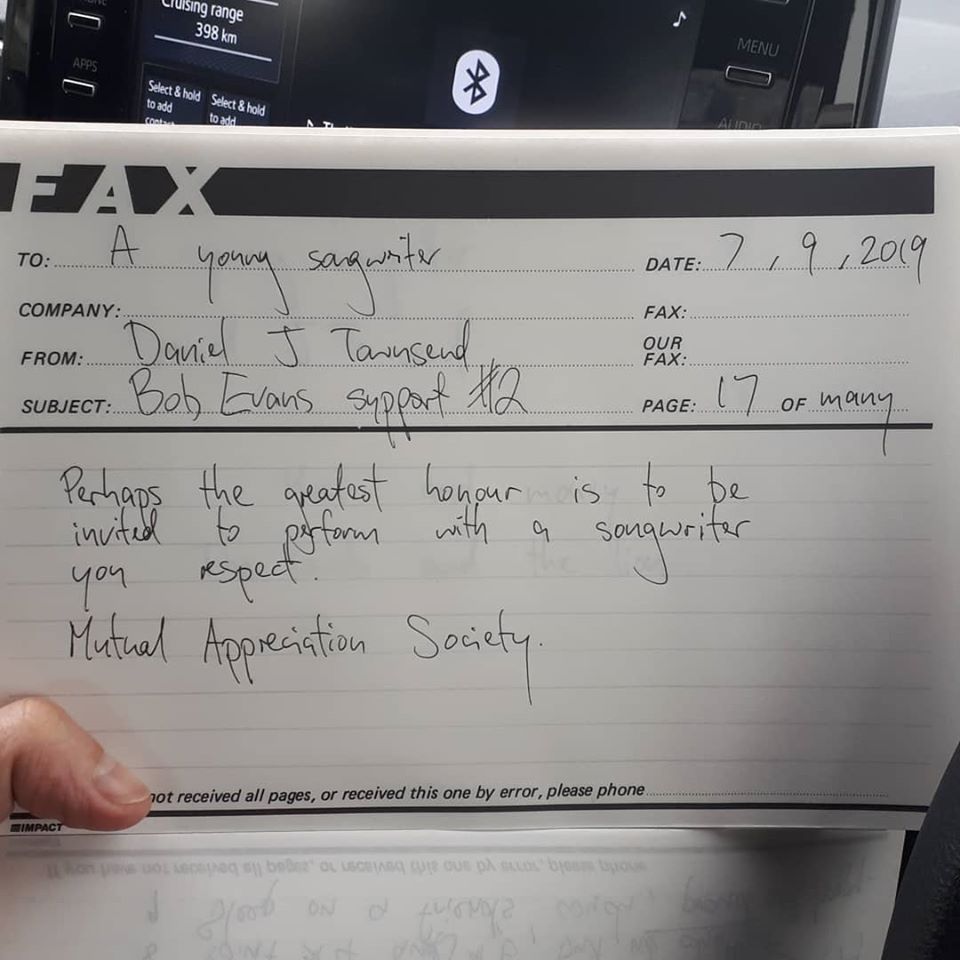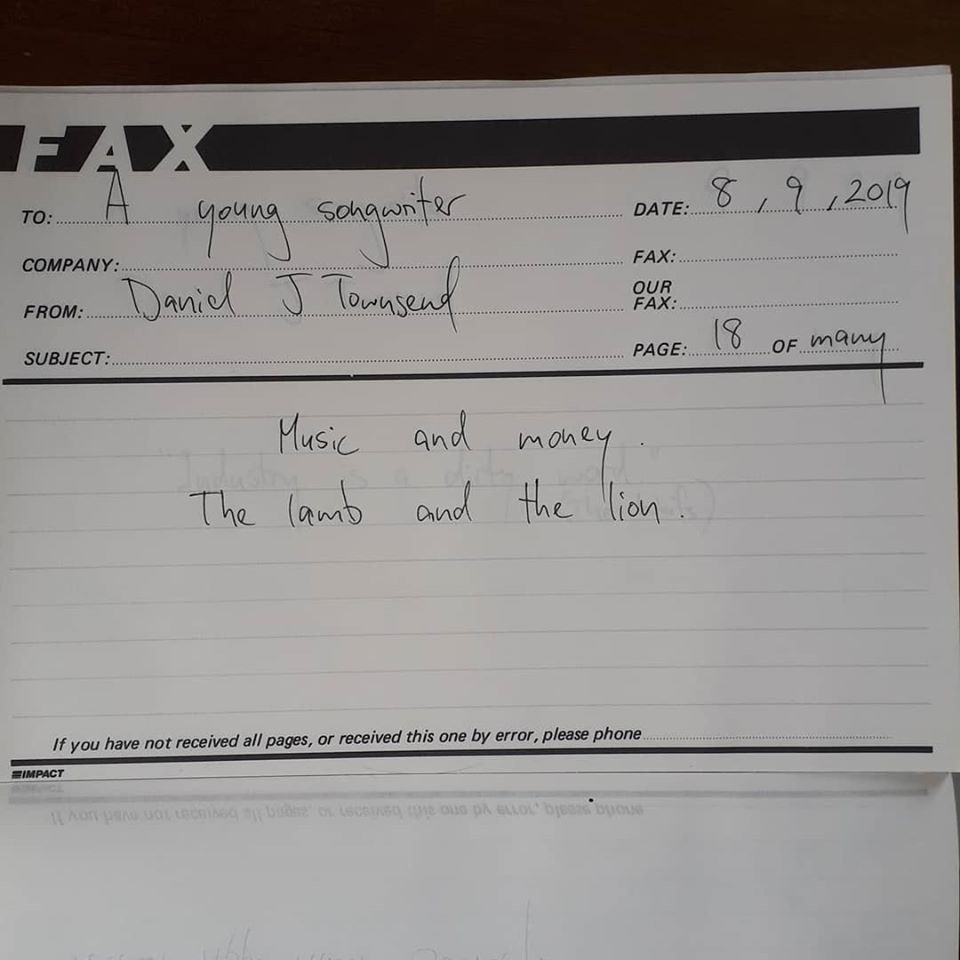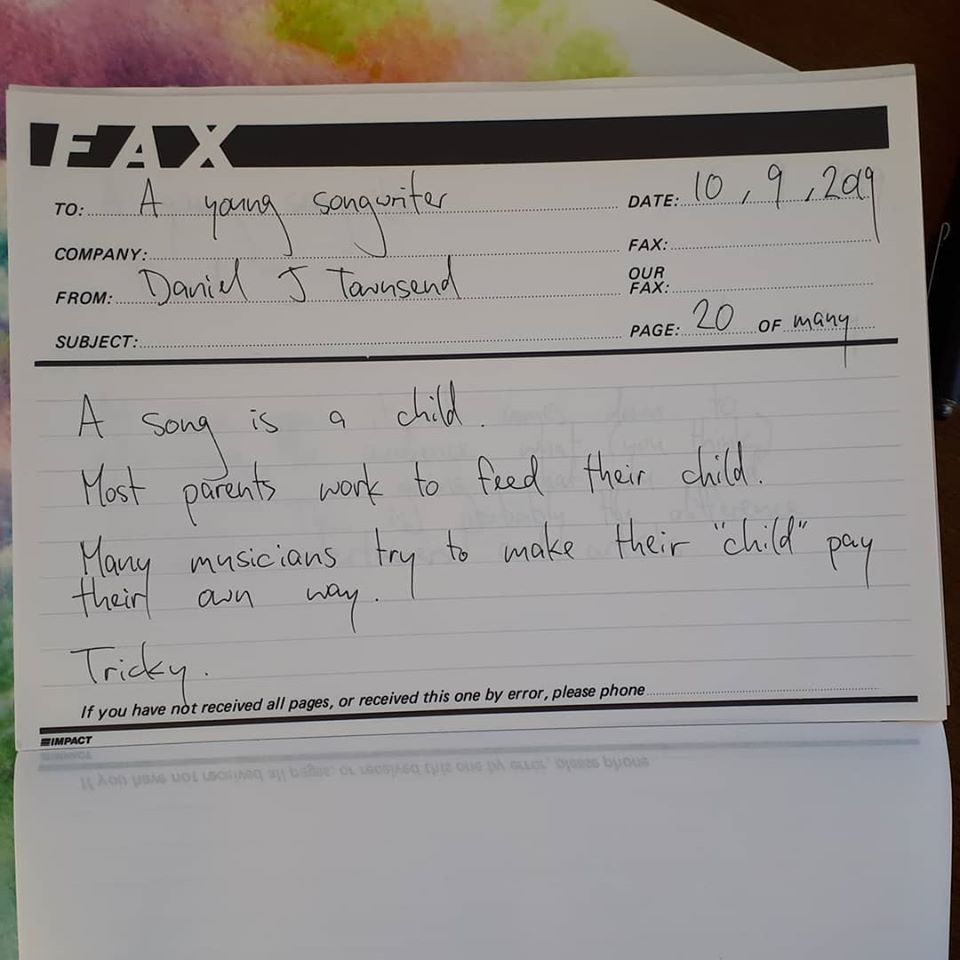You don't need a smartphone to know which way the wind blows. So stop living as if you do. Put that bloody thing away and watch the clouds for ten minutes.
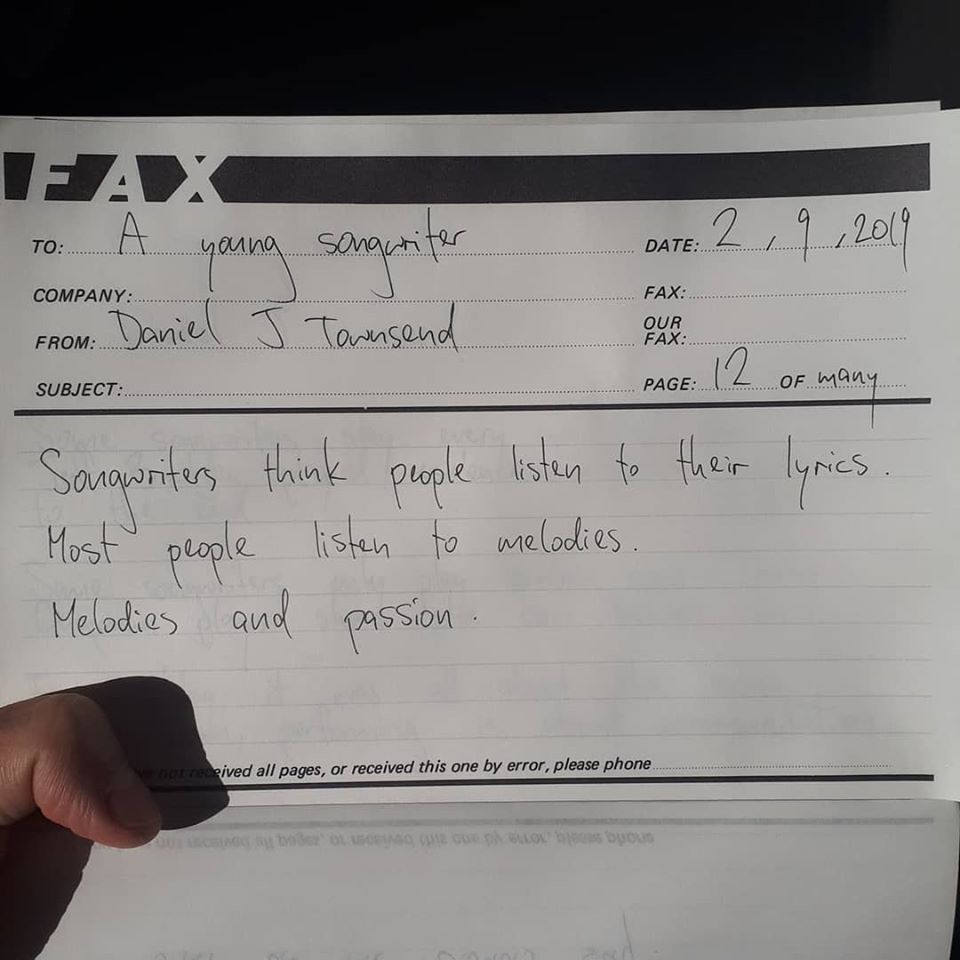
I'm a lyrics man. But you knew that already.
I once worked with a songwriter who was a melody man. It was like we were speaking and hearing different languages. We'd listen to an album and he'd describe the experience as like the music was flowing over him, whereas I'd had my nose in the lyrics book, stroking my chin. He loved the heartfelt gobbledygook of Sigur Ros. I didn't.
Not surprisingly, pretty much all his songs were instantly likeable. Memorable, too. I recorded one of them on my Iscariot record for the sole reason that the lyrical content either side of that song was too heavy. Good melodies make you feel lighter, shining light onto shadows.
Bon Iver famously wrote the songs on his debut by making words up, improvising sounds as he sung melodies. Nobody knows what those lyrics mean, but we understand their intention deeply. That one record spawned a movement of melody and passion. Furrowed brows, closed eyes and songs from the top of the lungs.
It's why Coldplay's 'Fix You' is so moving. It's a great, wholehearted melody. And, luckily for Chris Martin, it's not about the lyrics: "When you try your best but don't succeed [...] I'll try to fix you."
Melodies and passion, man.
"Naaah, nah nah, na nana naaah. Na nana naaah. Hey Jude." What a beauty! Sing it like you mean it.
I once worked with a songwriter who was a melody man. It was like we were speaking and hearing different languages. We'd listen to an album and he'd describe the experience as like the music was flowing over him, whereas I'd had my nose in the lyrics book, stroking my chin. He loved the heartfelt gobbledygook of Sigur Ros. I didn't.
Not surprisingly, pretty much all his songs were instantly likeable. Memorable, too. I recorded one of them on my Iscariot record for the sole reason that the lyrical content either side of that song was too heavy. Good melodies make you feel lighter, shining light onto shadows.
Bon Iver famously wrote the songs on his debut by making words up, improvising sounds as he sung melodies. Nobody knows what those lyrics mean, but we understand their intention deeply. That one record spawned a movement of melody and passion. Furrowed brows, closed eyes and songs from the top of the lungs.
It's why Coldplay's 'Fix You' is so moving. It's a great, wholehearted melody. And, luckily for Chris Martin, it's not about the lyrics: "When you try your best but don't succeed [...] I'll try to fix you."
Melodies and passion, man.
"Naaah, nah nah, na nana naaah. Na nana naaah. Hey Jude." What a beauty! Sing it like you mean it.
I have always envied musicians who play music for music's sake.
Last week I watched a jazz quartet making the most incredible sounds to a room full of people oblivious to their existence. And the musicians were having a great time. I arrived partway through their set and got the impression, when I applauded, that I was the first person to really acknowledge them. The violinist nodded and smiled at me, like musos do. But he wasn't playing for me. He was playing music for the love of music.
I'm a communicator. I write songs for three reasons. Firstly, sometimes because a song is asking to be written. (My wife can recognise when this is happening by my body language.) Secondly, because I need or want to hear the song. Thirdly, because I have something to say to my audience.
The first two reasons are enough, most of the time. I don't need to play them to anyone, so I don't tend to do gigs like that jazz quartet. Those guys make me feel lonely.
The third reason, communicating to an audience, is why you are here. Maybe you've heard me play sonewhere, or found me online, or you just enjoy this weird Faxes to a Young Songwriter thing. I play to the listeners. I write for the readers.
Sometimes I wish I could just play and play, like one of those jazz guys. Sometimes.
Last week I watched a jazz quartet making the most incredible sounds to a room full of people oblivious to their existence. And the musicians were having a great time. I arrived partway through their set and got the impression, when I applauded, that I was the first person to really acknowledge them. The violinist nodded and smiled at me, like musos do. But he wasn't playing for me. He was playing music for the love of music.
I'm a communicator. I write songs for three reasons. Firstly, sometimes because a song is asking to be written. (My wife can recognise when this is happening by my body language.) Secondly, because I need or want to hear the song. Thirdly, because I have something to say to my audience.
The first two reasons are enough, most of the time. I don't need to play them to anyone, so I don't tend to do gigs like that jazz quartet. Those guys make me feel lonely.
The third reason, communicating to an audience, is why you are here. Maybe you've heard me play sonewhere, or found me online, or you just enjoy this weird Faxes to a Young Songwriter thing. I play to the listeners. I write for the readers.
Sometimes I wish I could just play and play, like one of those jazz guys. Sometimes.
When I was a young songwriter, I thought live music was either Originals or Covers. Wrong.
I still see musicians and venues promoting music in this way. Interestingly, I've never heard punters use these terms. ("Man, I'm so keen to hear some covers tonight!" "You know what made last night so awesome? Three hours of original songs I'd never heard!")
Original Music Nights tend to pop up and burn out shortly after because nobody turns up to the shows. Not even so-called "original musicians," who should know better.
And nobody hosts Cover Music Nights. They just create the party vibe and slot the musician in to give the jukebox a break. ("Cover musicians" don't turn up to these shows either, because they're playing the sane songs somewhere else.)
Both these scenarios are boring to me. And when it comes to live music, Don Walker put it best: "There is only one rule: Don't bore people."
Live music is not about Originals versus Covers. It's about un-boring people. More accurately, the purpose of music is to bring people to life.
So, do what you've got to do. If your own songs are making people bored, maybe you need to study the Greats. Get back to the well, back to the quarry. Imitate and incubate.
Most songs are boring. A precious few bring folks to life. Go work out why this is.
I still see musicians and venues promoting music in this way. Interestingly, I've never heard punters use these terms. ("Man, I'm so keen to hear some covers tonight!" "You know what made last night so awesome? Three hours of original songs I'd never heard!")
Original Music Nights tend to pop up and burn out shortly after because nobody turns up to the shows. Not even so-called "original musicians," who should know better.
And nobody hosts Cover Music Nights. They just create the party vibe and slot the musician in to give the jukebox a break. ("Cover musicians" don't turn up to these shows either, because they're playing the sane songs somewhere else.)
Both these scenarios are boring to me. And when it comes to live music, Don Walker put it best: "There is only one rule: Don't bore people."
Live music is not about Originals versus Covers. It's about un-boring people. More accurately, the purpose of music is to bring people to life.
So, do what you've got to do. If your own songs are making people bored, maybe you need to study the Greats. Get back to the well, back to the quarry. Imitate and incubate.
Most songs are boring. A precious few bring folks to life. Go work out why this is.
How to slowly self-destruct:
1. Find a noisy room
2. Drink alcohol
3. Eat greasy food
4. Stay up late
5. Shout to/at your friends
6. Sleep in your jeans
7. Repeat ad nauseum
Seriously. Get that out of your system as soon as you've got the will.
You're made of water. Drink it or disappear completely.
1. Find a noisy room
2. Drink alcohol
3. Eat greasy food
4. Stay up late
5. Shout to/at your friends
6. Sleep in your jeans
7. Repeat ad nauseum
Seriously. Get that out of your system as soon as you've got the will.
You're made of water. Drink it or disappear completely.
Hey, Daniel. Do you get nervous before you perform?
Nervous?
Yeah, like, anxious?
No. But I do write the show date on my fridge calendar and then start to mentally sculpt my life around that impending engagement. How I'll get to the show, where I'll stay, if I can bring the family. That stressful sort of mini-holiday planning.
I think about the venue, the audience, what's going on in the world and what I have to contribute to the conversation. I write new songs in my head. I dedicate half a notebook to refining that song, which may never be performed but demands to be written anyway. Thoughts of songs and setlists rattle around my mind like a handful of marbles in the car glove box.
I buy strings the week of the show, change them all over again. The day before the show, my mind checks out and rehearses all by itself. Sometimes I'll dream that I'm naked in public or that I've rocked up to work without my shoes. I get to the venue allowing enough time for my soul to meet the place, meet the people I need to know and immediately forget their names, had to the green room and walk in circles with my guitar. Don't eat. Drink water. Choose to breathe deeply. Visualise the first two songs in my set, then the final two. Rewrite my set. Question my judgement. Re-rewrite my set. Then it's five minutes and I am intensely present...
Yes. I get anxious every time. But I don't get butterflies, if that's what you mean.
Nervous?
Yeah, like, anxious?
No. But I do write the show date on my fridge calendar and then start to mentally sculpt my life around that impending engagement. How I'll get to the show, where I'll stay, if I can bring the family. That stressful sort of mini-holiday planning.
I think about the venue, the audience, what's going on in the world and what I have to contribute to the conversation. I write new songs in my head. I dedicate half a notebook to refining that song, which may never be performed but demands to be written anyway. Thoughts of songs and setlists rattle around my mind like a handful of marbles in the car glove box.
I buy strings the week of the show, change them all over again. The day before the show, my mind checks out and rehearses all by itself. Sometimes I'll dream that I'm naked in public or that I've rocked up to work without my shoes. I get to the venue allowing enough time for my soul to meet the place, meet the people I need to know and immediately forget their names, had to the green room and walk in circles with my guitar. Don't eat. Drink water. Choose to breathe deeply. Visualise the first two songs in my set, then the final two. Rewrite my set. Question my judgement. Re-rewrite my set. Then it's five minutes and I am intensely present...
Yes. I get anxious every time. But I don't get butterflies, if that's what you mean.
There is a good chance you were born into the wrong family. This is nobody's fault, so there is no need to get out your pointy fingers. It just tends to be the lot of the artist.
At some point you will need to find your artistic family. Often this starts at home, listening to musicians and singers who really speak to you. Joni Mitchell and Billie Holliday and Ruby Gill may well be your Songsisters. James Taylor and Leadbelly and Bob Evans may be your Songbrothers. Songsiblings. Joe Cocker, Tom Waits and Keb Mo might be your cool uncle who rocks up to the Christmas barbeque wearing sunglasses. Your Sungcle.
You start to find your tribe. Or, more accurately, your tribe finds you.
Never underestimate the importance of your Songfamily. They may not know you're alive, but they bring you to life. One day, long down the road, you may well play a show with them. Face to face with family. It's magic.
Who is in your Songfamily?
At some point you will need to find your artistic family. Often this starts at home, listening to musicians and singers who really speak to you. Joni Mitchell and Billie Holliday and Ruby Gill may well be your Songsisters. James Taylor and Leadbelly and Bob Evans may be your Songbrothers. Songsiblings. Joe Cocker, Tom Waits and Keb Mo might be your cool uncle who rocks up to the Christmas barbeque wearing sunglasses. Your Sungcle.
You start to find your tribe. Or, more accurately, your tribe finds you.
Never underestimate the importance of your Songfamily. They may not know you're alive, but they bring you to life. One day, long down the road, you may well play a show with them. Face to face with family. It's magic.
Who is in your Songfamily?
My greatest work cost me thousands to bring to completion. I will never make that money back and I don't care. If I hadn't produced it, the thing would have festered somewhere in my soul and that is a cost I could never afford.
This is counter-cultural to what we in Australia call "economic rationalism". It's Thatcherism in the UK, Reaganism in the US. The belief that the primary measure of success is efficiency and productivity. Kmart makes sense in that worldview. So does killing off the Thylacine so we can graze cattle, logging the Amazon and wrapping food in plastic.
Songwriting is inefficient and not necessarily productive, and yet it must be done.
When it comes down to music versus money, find a way to help music win.
This is counter-cultural to what we in Australia call "economic rationalism". It's Thatcherism in the UK, Reaganism in the US. The belief that the primary measure of success is efficiency and productivity. Kmart makes sense in that worldview. So does killing off the Thylacine so we can graze cattle, logging the Amazon and wrapping food in plastic.
Songwriting is inefficient and not necessarily productive, and yet it must be done.
When it comes down to music versus money, find a way to help music win.
Friedrich Nietzsche once said "After coming into contact with a religious man I always feel I must wash my hands."
It's the same for me whenever I meet industry folks. They don't even need to wear suits or chomp on cigars any more, but it's the same old thing: Treating a song as a commodity, watching a young songwriter perform and calculating their economic worth.
These days "industry folks" are usually not even humans. They're algorithms, social media statistics, numbers of followers and likes and shares and such, synonymising popularity with quality.
Sing no more for your pocket calculator.
It's the same for me whenever I meet industry folks. They don't even need to wear suits or chomp on cigars any more, but it's the same old thing: Treating a song as a commodity, watching a young songwriter perform and calculating their economic worth.
These days "industry folks" are usually not even humans. They're algorithms, social media statistics, numbers of followers and likes and shares and such, synonymising popularity with quality.
Sing no more for your pocket calculator.
I decided very early on that I would work to pay for my art, rather than make my art my job. I've had plenty of joe-jobs to pay for recording sessions (and rent) but one job really sticks in my memory.
Yes, I've delivered pizzas, cleaned toilets, built fences, drove a truck, taught guitar, dug holes, mowed lawns and worked with ratbag kids. All of which were rich with storytelling material. But the standout was when I sold my body to science.
The study was on the effects of intravenous feeding. I had a tube shoved up my nose and down my throat, with a needle in my arm connected to a rainbow spaghetti of cords hooked up to a computer. I had to lay still (no rolling over, no sleeping) for eight hours, with daytime TV for company.
Hell is a scientific experiment.
Seven hours in, I threw up. The feeding tube dangled in my lap, covered in vomit. The scientist had to pull it back through my nose. I used some toilet paper to blow the chunks from my nose. Twenty-one years old, I had to call my dad to pick me up because I was too crook to drive.
I spent the cash on my first demo recording. Follow your dreams, kid.
Yes, I've delivered pizzas, cleaned toilets, built fences, drove a truck, taught guitar, dug holes, mowed lawns and worked with ratbag kids. All of which were rich with storytelling material. But the standout was when I sold my body to science.
The study was on the effects of intravenous feeding. I had a tube shoved up my nose and down my throat, with a needle in my arm connected to a rainbow spaghetti of cords hooked up to a computer. I had to lay still (no rolling over, no sleeping) for eight hours, with daytime TV for company.
Hell is a scientific experiment.
Seven hours in, I threw up. The feeding tube dangled in my lap, covered in vomit. The scientist had to pull it back through my nose. I used some toilet paper to blow the chunks from my nose. Twenty-one years old, I had to call my dad to pick me up because I was too crook to drive.
I spent the cash on my first demo recording. Follow your dreams, kid.
